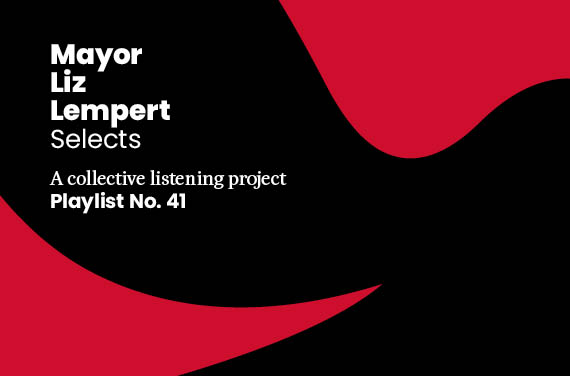Welcome to our 2023-2024 season!
Collective Listening Project
Mayor Liz Lempert Selects
Playlist No. 41
About the Playlist
January 21, 2021

This week’s Collective Listening Project pays homage to inauguration, this most memorable moment in our nation’s history, by considering the intersection of music and politics. Curated by newly retired Mayor Liz Lempert, who just served two four-year terms as the first mayor of Princeton’s consolidated municipality, our newest playlist is a bit of a twist on our usual playlists. Instead of music, it features her favorite episodes of podcasts about classical music. In this time of intense reflection, we hope that it provides an opportunity to not only listen to poignant musical works but also step back and consider them in context.
During the pandemic, I’ve increased my podcast consumption significantly! Here are a few of my favorite classical music shows and episodes:
The Concert—Isabella Stewart Gardner Museum
Episode #256: Taking It Slow LISTEN>
Episode #178: Poetry in Sound LISTEN>
A podcast of wonderful live performances from the magical museum in Boston. There are hundreds of episodes, and I haven’t made it through them all yet. A couple of my favorites so far have been #256 “Taking It Slow” (Antonio Vivaldi’s Concerto in C Major for Soprano Recorder and Orchestra and Ludwig van Beethoven’s String Quintet in C Major, Op. 29) and #178 “Poetry in Sound” (Gabriel Fauré’s Élégie Op. 24 and César Franck’s Violin Sonata in A Major transcribed for cello).
Decomposed with Jade Simmons
Episode No. 1: A fallen, abominable, wicked girl LISTEN>
Episode No. 3: Why did you betray me? LISTEN>
This is a terrifically entertaining podcast that interweaves music with the behind-the-scenes stories of love, heartbreak, betrayal, humanity, and genius surrounding the great composers and their masterpieces. My favorite episodes: #1 “A fallen, abominable, wicked girl” about Clara Schumann and #3 “Why did you betray me?” about Pyotr Ilyich Tchaikovsky’s complicated relationship with his benefactor and confidant.
Sticky Notes: The Classical Music Podcast, hosted by conductor Joshua Weilerstein, Artistic Director of the Orchestre de Chambre de Lausanne
Episode: Politics in Classical Music LISTEN>
I especially enjoyed the Politics in Classical Music episode which sheds light on several examples of music as political statement including Franz Joseph Haydn’s Symphony No. 45 featuring a symbolic protest on behalf of overworked musicians, Wolfgang Amadeus Mozart’s Marriage of Figaro as a statement on class struggle, Ethel Smyth’s women’s suffrage anthem, “March of the Women,” Kurt Weill’s sung ballet Seven Deadly Sins, a satirical leftist ode to anti-capitalism, the haunting Threnody to the Victims of Hiroshima by Krzysztof Penderecki, and George Crumb’s anti-Vietnam War work, Black Angels. Weilerstein ends the episode with Frederic Rzewski’s piano composition The People United Will Never Be Defeated!, writen as a tribute to the struggle of the Chilean people against the repressive Augusto Pinochet regime but just as relevant to us today as a call for solidarity in the fight against facism.



